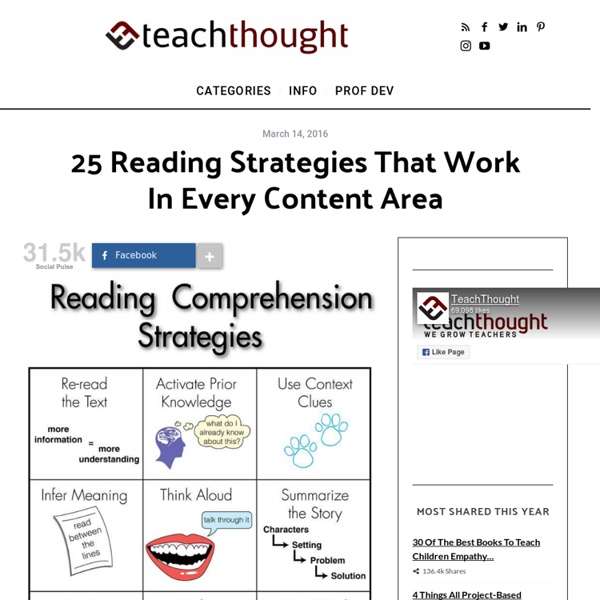How to Improve Your English Pronunciation to Talk Like a Native
“What?” “Can you say that again?” How many times do you hear this when you’re speaking? Even if your vocabulary and English grammar are perfect, it can still be difficult for people to understand you because of your pronunciation. Learning to pronounce English words correctly can be one of the hardest parts of learning English.
1,150 Free Movies Online: Great Classics, Indies, Noir, Westerns
Watch 4,000+ movies free online. Includes classics, indies, film noir, documentaries and other films, created by some of our greatest actors, actresses and directors. The collection is divided into the following categories: Comedy & Drama; Film Noir, Horror & Hitchcock; Westerns (many with John Wayne); Martial Arts Movies; Silent Films; Documentaries, and Animation.
Questioning That Deepens Comprehension
Editor's note: This post is co-authored by Nancy Frey, a Professor of Literacy in Educational Leadership at San Diego State University and a credentialed special educator, reading specialist, and administrator. Questions are a common way for teachers to check for understanding, right? The answer we’re looking for is "yes." Who hasn't questioned a group of students to determine whether or not they understood the content? Unfortunately, not all questions are created equally.
10 Ways to Teach Argument-Writing With The New York Times - The New York Times
How would your students describe the differences between the news sections of a newspaper and the opinion section? What do they have in common? How do they differ? Where else in newspapers are opinions — for instance, in the form of reviews or personal essays — often published? Bring in a few print copies of a newspaper, whether The Times or a local or school paper, and have your students work in small groups to contrast a news page with an opinion page and see what they discover. Though this piece, “And Now a Word From Op-Ed,” is from 2004, it still provides a useful and quick overview of The Times’s Opinion section, even if the section then was mostly a print product.
A Handy Guide to Ruffians, Rapscallions, Cads & More
Definition: a mischievous and often morally corrupt person Examples: "The captain of Company L refused to recognize us; said we were deserters, and traitors, and scalawags; and when he drew rations for Company L from the commissary, he wouldn't give us any." - Jack London, The Road, 1907 "When times are good, the public generally prefers a scalawag. Clinton was the perfect president for the '90s boom years.
Writing Fiction
Win a school subscription to Studyzone's coding curriculum! Enter our giveaway now. Close Search for Ideas and Resources Filter Results
45 ways to avoid using the word 'very'
Writers Write is your one-stop resource for writers. Use these 45 ways to avoid using the word ‘very’ to improve your writing. Good writers avoid peppering their writing with qualifiers like ‘very’ and ‘really’. They are known as padding or filler words and generally add little to your writing.
One Book, One School: Building Community with Shared Text
Some time ago I had the opportunity to read an early copy of R.J. Palacio’s debut novel, Wonder . I’d heard about it through friends and eagerly anticipated reading it. The book took my breath away. The next spring brought opportunities to meet the author, talk about the book with colleagues, and read it to my class.
Nik's QuickShout: 10 Tools & Resources for Developing Writing Skills
Over the last couple of months I've found and written about a number of really great tools and resources to help improve our students' writing skills. This is a collection of links to reviews of ten of the best. 1. Free Reading Passages and Progress Tracking Tools



